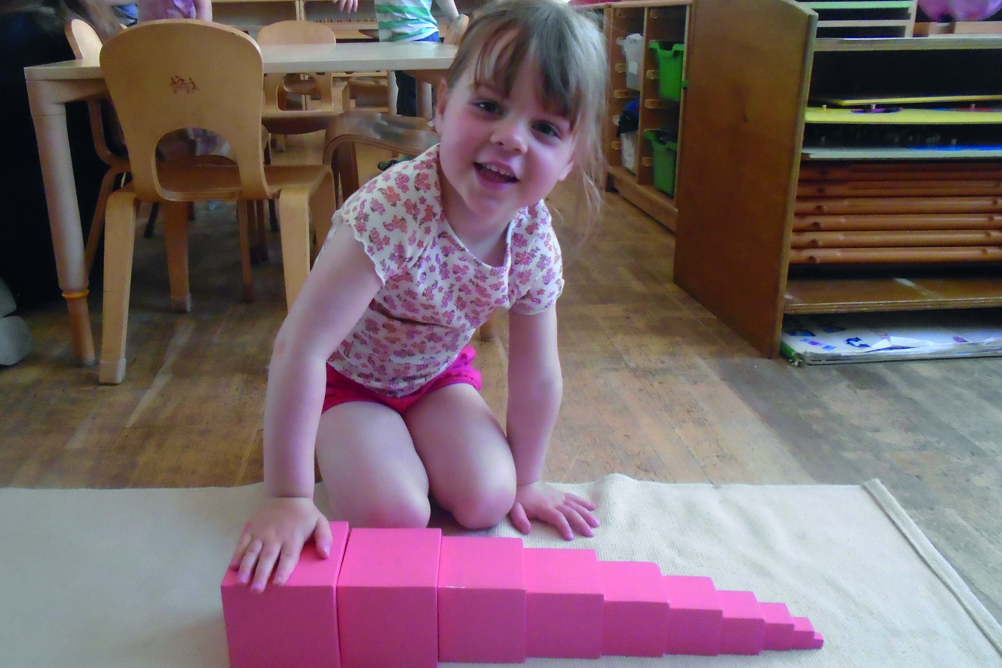
Maria Montessori famously started her educational philosophy in the slums of Rome, working with what might be termed today as ‘latchkey’ children, whose parents were out at work all day. What she observed was that if children are given a combination of the right environment along with respectful and nurturing adults who follow the child’s lead, then all children, irrespective of their background, can flourish and thrive.
Her pedagogy has achieved global success and children around the world are seen thriving in Montessori environments.

The workers of the future have ‘much to learn’ from Maria Montessori, Leonor Stjepic, CEO of the Montessori Group, an umbrella organisation that incorporates Montessori St Nicholas, told Nursery World on the 100th anniversary of Montessori training in the UK.
She added, ‘They have to have the sort of skills that we value in Montessori, the ability to be creative, collaborative, problem solve.’
NURTURING INDEPENDENCE
Montessori is based on the belief that every child can achieve their unique potential if offered an educational environment in which they are free to choose from a range of developmental activities that are appropriate to their age and stage of learning. The method involves nurturing the whole person, emotionally, socially, physically, spiritually and intellectually.
It was founded in Italy in the early 1900s by scientist and educator Dr Maria Montessori (1870 to 1952), who went on to develop a set of resources aimed at fostering children’s life skills and helping them develop confidence, independence and self-esteem.
Activities and resources are laid out on low shelves that are easily accessible, and children are free to choose from the activities and develop their own rhythm and work pattern. Once finished, each item is carefully returned to the shelf to support the ‘cycle of activity’ and instil a sense of order. Each resource has built-in ‘control of error’, which means children do not need much adult supervision.
‘The whole environment is designed around the needs of the child with a particular focus on their independence, agency and motivation’, explains Dr Nathan Archer, director of International Montessori Institute.
‘Maria Montessori designed these environments with child-sized furniture, which didn’t even exist at the time, so she was a real initiator of a child-centred physical environment,’ he adds.
DAILY LIFE
Activities such as pouring water from a jug into a glass, hand-washing, washing dishes, hanging clothes on the line and setting the dinner table are an integral part of Montessori education. There is also evidence that these types of activities support children’s executive functioning, Dr Archer says, with many of the activities proven to help with memory, task initiation and emotional control.
Children learn ‘hands on’ activities in stages, moving onto the next stage when they are ready. When it comes to pouring a glass of water, for example, children are introduced to the concept by accessing a tray that has a jug of lentils and an empty jug to practise dry pouring, explains Jo Robinson, manager at The Children’s House, a 93-place Montessori day nursery and after-school provision in Stallingborough, Lincolnshire.
‘They then progress to pouring water from a jug into another jug through a funnel up to a certain line and finally pouring from a glass jug and into a glass of water. There’s always a sponge on the tray so that they can independently mop up any spillages,’ she adds.
Dressing frames are another resource. There is a button frame, a Velcro frame, a zip frame and a laces frame, all designed to help children gain the confidence to perform the essential task of getting dressed.
‘This is an area of the classroom that evolves with time, and can be led by the community interests,’ Dr Archer explains. ‘For example, it could include packing a suitcase or polishing shoes – I have even seen how to use an iron in one classroom – but it also includes contemporary life skills, such as learning how to use an iPad.’
SENSORIAL ACTIVITIES
Maria Montessori’s method and materials were developed around the idea that children learn best when all their senses are involved. Many of the resources in the sensorial range are also an important precursor to maths. ‘They’re not explicitly about number but they hone the child’s spatial reasoning, quantity and volume,’ explains Dr Archer.
Here are two examples of sensorial activities and resources:
The Pink Tower is a set of ten wooden cubes which increase in size by 1 cubic centimetre each, from 1cm3 to 10cm. It is usually the first Montessori resource that children work with, and the idea is to place each cube, in size order, on top of the other and end up with a tower.
Jo says, ‘Four year-old Ellie [name changed, pictured] is a confident child and she enjoys going back to this resource, playing with it in a variety of different ways. She starts by carrying each cube to the workspace individually, which helps her visual discrimination skills. She builds upwards, and also lays it flat on the mat, and adds marbles to roll down the “stairs”. She enjoys helping younger children with it and taking on the role of the teacher. It helps her learn about length, width and height, as well as refining fine motor skills.’
The Red Rods comprise ten wooden rods that increase in length by increments of 10cm, the largest being 100cm. The rods introduce children to mathematical concepts such as counting, length, the decimal system and addition. Their purpose is to develop a child’s visual perception skills as they carry them from the shelf and arrange them in length order on the floor. Through repetition, the child learns to discriminate between long and short and builds a stair formation and the iconic maze.

Jo says, ‘Four-year-old James [name changed, pictured] is a quiet boy who likes to move around a lot and is good at sport. He enjoys the physical aspect of this activity: taking the rods, one by one, to the mat on the floor. He takes his time ordering them, often standing up, walking around the mat to see which parts he needs to revisit. He loves the sense of accomplishment when he’s completed the activity – making the stairs or the maze. Rather than relying on adult gratification, the activities are designed to give children the tools to be able to do it themselves. We also support them with gentle praise, of course, and encouragement.’
SUPPLIERS
There are various suppliers of Montessori resources in the UK. Some are authentic resources replicating Maria Montessori’s designs, and others are natural resources inspired by Montessori that can be used in any setting to create an enabling environment.
Absorbent Minds stocks the premium range of Nienhuis Montessori products, including the Practical Life dressing frames. Try the Buttoning Frame with Large Buttons, £32.90, or for sensorial resources try the Pink Tower, £74.70, or the Red Rods, £103.10. The Montessori Nursery Starter Pack of 40 resources, £1,125.50, can also be purchased for new settings.
Cosy’s toddler-friendly furniture range is the ideal height for self-selection. Try the Rookie Range – Open Shelf, £129.99; the Low Front Facing Book Case, £220; or the Hex Table and 4 Perch Pods, £235. The Montessori Emotion Box, £37.99, is great for supporting children’s personal, social and emotional development. Or for role play, try Cosy’s Wide Dressing Up Station Self-standing, £295.

TTS supplies a range of Montessori-inspired natural materials. Try the Wooden Twist and Turn Spinning Tops (above) – 3pk, £99.99; the Wooden Mirrored Blocks and Storage Tray, 25pcs, £79.99; and the Tactile Wooden Pebble Collection, £14.99.
case study: The Children’s House, Stallingborough, Lincolnshire
The Children’s House is situated in an area which has high levels of deprivation and there is a diverse mix of children, attending on unfunded and funded places for two-year-olds, three-year-olds and four-year-olds.
Manager Jo Robinson says, ‘Our setting is purpose-built with lots of natural light, spacious rooms and roof windows. Interior colours are neutral and there is an emphasis on natural materials. The furniture is child-sized, wooden and sourced from Community Playthings. Children’s artwork is presented like an art gallery in a few designated areas around the nursery.
‘It’s a privilege to support a child by introducing them to a new piece of Montessori equipment that will help to bolster their learning. The materials introduce concrete concepts rather than abstract ones. Each activity is designed with a number of direct and indirect learning aims, and having a deep understanding of these is key to the Montessori teacher training. For example, sweeping up sawdust from the classroom floor will help a child to tidy their immediate environment, but it will also support concentration, hand-eye co-ordination and visual discrimination.
‘By completing a task, a child will finish the “cycle of activity”; this has been of vital importance when promoting concentration and attention skills, particularly over the past few years.’
Dr Archer is undertaking a small-scale study to address two identified gaps in Montessori education: provision in disadvantaged areas in England and the social mix of children attending these settings. He would like to hear from any Montessori settings in socio-economically disadvantaged areas and hopes to report back next year. To contact him, email n.j.archer@leedsbeckett.ac.uk









